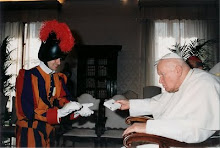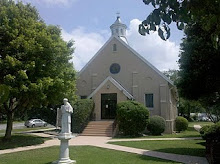The head of the Archdiocese for the Military Services reiterates his concern for greater conscience protection.
by JOAN FRAWLEY DESMOND
07/26/2013 Comments (1)
Archbishop Timothy Broglio
– milarch.org
Archbishop Timothy Broglio of the Archdiocese for the Military Services is the spiritual leader of 1.8 million Catholics.
During a July 25 interview with Register senior editor Joan Frawley Desmond, he discusses emerging challenges to the religious freedom of Catholics in uniform in the wake of the recent U.S. Supreme Court ruling that overturned part of the Defense of Marriage Act (DOMA) that defines marriage as a union of one man and one woman.
Archbishop Broglio notes that Catholic chaplains may not be able to hold marriage retreats in the future, and he endorsed Louisiana Rep. John Fleming’s amendment that would strengthen conscience protections for military personnel.
Amid a serious shortage of Catholic chaplains — just 250 to serve Catholics on military bases at home and abroad — he notes that some evangelical groups are drawing Catholics into their churches.
Are Catholic chaplains and service members facing challenges to the practice of their faith right now?
The challenges are twofold. One is the preservation of their own freedom of conscience, which is well guaranteed by the First Amendment. I don’t think any Catholic chaplain will be asked to do anything against his conscience. But the military has ways to deal with those they want to reprimand, and that can come through promotions and assignments.
Second, some chaplains charged with the pastoral care of Catholics in the military are asking, “Are these orders I am asked to fulfill, with regard to people in same-gendered unions, a responsibility I must meet?” That is a more difficult question, and we are still wrestling with it so we can give good guidance.
In late April and early May, several statements were issued by the Department of Defense and the Air Force on the subject of religious proselytization, and critics argued that the Pentagon was suppressing religious speech. But on May 2, DOD issued a clarifying statement, “Service members can share their faith (evangelize) but must not force unwanted, intrusive attempts to convert others of any faith or no faith to one's beliefs (proselytization).” Are you satisfied with that statement?
Basically, we are dealing with a situation in which publicity was created in order to call attention to a given organization, which had requested a meeting at the Pentagon. The clarification is there for anyone who might be concerned about previous statements.
How is proselytization defined?
You are asking them if they have been saved and inviting them to your services in a demanding way. Chaplains are officers and exert a certain influence
What issues could become problematic, now that the Defense of Marriage Act has been overturned?
A Catholic chaplain will certainly not be required to witness any ceremony contrary to his religious beliefs. Even if he is called to counsel two people in this situation, he could send them to someone who might be able to help them. Obviously, that is where we begin to get into issues where there may be difficulties.
Chaplains hold marriage retreats — “Strong Bonds” retreats. Probably Catholic priests will not be able to conduct retreats if there are same-gendered unions.
Last week, Russell Moore, head of the Southern Baptist Conference’s Ethics and Religious Liberty Commission, told The Washington Post, “I’m worried about the silencing of various voices in order to have a generic civil religion we can all agree on.” Is that a danger?
That is a danger. We have already seen that happen with various Protestant groups. If you go to a military base, you don’t see a marquee on the chapel announcing when the Methodists or Presbyterians are meeting. You will see “Traditional Protestant” service, “Gospel” service and, perhaps, “Contemporary Protestant” service. In a certain sense, the military has already amalgamated groups into something like generic Protestants.
We wouldn’t want to see that go any farther. Any attempt to melt the Catholic Church into a generic civil religion would effectively deny the freedom of conscience the First Amendment guarantees.
This has been tried in the past — if you look at Nazi Germany and some of the conniving attempts of Stalin.
A chaplain is on a base so he can provide for religious education and formation for his people. If they can’t do that, then we shouldn’t have chaplains in the military.
What is the role of a military chaplain, and how could that role change in the future?
He has a defined religious role, according to his faith tradition.
He is also a counselor. He is the one person on the base that any member of the military or a child or spouse can talk to — and he does not have to report what they talked about. That is confidential and is well defined in the military.
As a command chaplain, he has the responsibility to advise the commander about the tenor of morale on the installation. The chaplain can also go to the commander and present situations and needs. He has access. As an officer, he has responsibility for keeping himself fit and participating in the life of the community.
You have endorsed Rep. John Fleming’s amendment to strengthen religious freedom, which was included in the House-passed National Defense Authorization Act. The Senate Armed Services Committee passed a similar amendment on a bipartisan vote, though President Obama has vowed to veto Fleming’s amendment.
It is certainly needed, because we have to ensure that the rights guaranteed under the Constitution are reaffirmed and expressed positively as it applied to the military. The reaction it has provoked shows that is indeed necessary.
It will reiterate and reinforce the conscience rights of all believers, especially as there are attempts to cast aspersions on those beliefs by calling them “hate speech.”
In a certain sense, those who oppose conscience protections are the same ones who want to define what a religion is and is not, and that is exactly what the Constitution does not permit.
Recently, some voices in the debate over religious freedom have argued that the threat to conscience rights comes from aggressive evangelical groups that have sought to convert Catholic service members. They have asked the Pentagon to clamp down on such efforts to proselytize. Has the Archdiocese for the Military Services received such reports, and would you describe it as a serious problem?
It is a problem. We have had evidence. I have heard of people baptized as Catholics who were then later converted to other Protestant denominations because of this presence.
I don’t want to color this as a malicious thing. They are much more numerous than we are. Catholic priests are at a premium in the military. This is a concern of the archdiocese and one reason why we have tried to strengthen our catechetical outreach and help Catholics deepen their understanding and appreciation for the faith.
If there was a clear issue of proselytization, I would bring it to the attention of the chief of chaplains.
During a July 25 interview with Register senior editor Joan Frawley Desmond, he discusses emerging challenges to the religious freedom of Catholics in uniform in the wake of the recent U.S. Supreme Court ruling that overturned part of the Defense of Marriage Act (DOMA) that defines marriage as a union of one man and one woman.
Archbishop Broglio notes that Catholic chaplains may not be able to hold marriage retreats in the future, and he endorsed Louisiana Rep. John Fleming’s amendment that would strengthen conscience protections for military personnel.
Amid a serious shortage of Catholic chaplains — just 250 to serve Catholics on military bases at home and abroad — he notes that some evangelical groups are drawing Catholics into their churches.
Are Catholic chaplains and service members facing challenges to the practice of their faith right now?
The challenges are twofold. One is the preservation of their own freedom of conscience, which is well guaranteed by the First Amendment. I don’t think any Catholic chaplain will be asked to do anything against his conscience. But the military has ways to deal with those they want to reprimand, and that can come through promotions and assignments.
Second, some chaplains charged with the pastoral care of Catholics in the military are asking, “Are these orders I am asked to fulfill, with regard to people in same-gendered unions, a responsibility I must meet?” That is a more difficult question, and we are still wrestling with it so we can give good guidance.
In late April and early May, several statements were issued by the Department of Defense and the Air Force on the subject of religious proselytization, and critics argued that the Pentagon was suppressing religious speech. But on May 2, DOD issued a clarifying statement, “Service members can share their faith (evangelize) but must not force unwanted, intrusive attempts to convert others of any faith or no faith to one's beliefs (proselytization).” Are you satisfied with that statement?
Basically, we are dealing with a situation in which publicity was created in order to call attention to a given organization, which had requested a meeting at the Pentagon. The clarification is there for anyone who might be concerned about previous statements.
How is proselytization defined?
You are asking them if they have been saved and inviting them to your services in a demanding way. Chaplains are officers and exert a certain influence
What issues could become problematic, now that the Defense of Marriage Act has been overturned?
A Catholic chaplain will certainly not be required to witness any ceremony contrary to his religious beliefs. Even if he is called to counsel two people in this situation, he could send them to someone who might be able to help them. Obviously, that is where we begin to get into issues where there may be difficulties.
Chaplains hold marriage retreats — “Strong Bonds” retreats. Probably Catholic priests will not be able to conduct retreats if there are same-gendered unions.
Last week, Russell Moore, head of the Southern Baptist Conference’s Ethics and Religious Liberty Commission, told The Washington Post, “I’m worried about the silencing of various voices in order to have a generic civil religion we can all agree on.” Is that a danger?
That is a danger. We have already seen that happen with various Protestant groups. If you go to a military base, you don’t see a marquee on the chapel announcing when the Methodists or Presbyterians are meeting. You will see “Traditional Protestant” service, “Gospel” service and, perhaps, “Contemporary Protestant” service. In a certain sense, the military has already amalgamated groups into something like generic Protestants.
We wouldn’t want to see that go any farther. Any attempt to melt the Catholic Church into a generic civil religion would effectively deny the freedom of conscience the First Amendment guarantees.
This has been tried in the past — if you look at Nazi Germany and some of the conniving attempts of Stalin.
A chaplain is on a base so he can provide for religious education and formation for his people. If they can’t do that, then we shouldn’t have chaplains in the military.
What is the role of a military chaplain, and how could that role change in the future?
He has a defined religious role, according to his faith tradition.
He is also a counselor. He is the one person on the base that any member of the military or a child or spouse can talk to — and he does not have to report what they talked about. That is confidential and is well defined in the military.
As a command chaplain, he has the responsibility to advise the commander about the tenor of morale on the installation. The chaplain can also go to the commander and present situations and needs. He has access. As an officer, he has responsibility for keeping himself fit and participating in the life of the community.
You have endorsed Rep. John Fleming’s amendment to strengthen religious freedom, which was included in the House-passed National Defense Authorization Act. The Senate Armed Services Committee passed a similar amendment on a bipartisan vote, though President Obama has vowed to veto Fleming’s amendment.
It is certainly needed, because we have to ensure that the rights guaranteed under the Constitution are reaffirmed and expressed positively as it applied to the military. The reaction it has provoked shows that is indeed necessary.
It will reiterate and reinforce the conscience rights of all believers, especially as there are attempts to cast aspersions on those beliefs by calling them “hate speech.”
In a certain sense, those who oppose conscience protections are the same ones who want to define what a religion is and is not, and that is exactly what the Constitution does not permit.
Recently, some voices in the debate over religious freedom have argued that the threat to conscience rights comes from aggressive evangelical groups that have sought to convert Catholic service members. They have asked the Pentagon to clamp down on such efforts to proselytize. Has the Archdiocese for the Military Services received such reports, and would you describe it as a serious problem?
It is a problem. We have had evidence. I have heard of people baptized as Catholics who were then later converted to other Protestant denominations because of this presence.
I don’t want to color this as a malicious thing. They are much more numerous than we are. Catholic priests are at a premium in the military. This is a concern of the archdiocese and one reason why we have tried to strengthen our catechetical outreach and help Catholics deepen their understanding and appreciation for the faith.
If there was a clear issue of proselytization, I would bring it to the attention of the chief of chaplains.
















